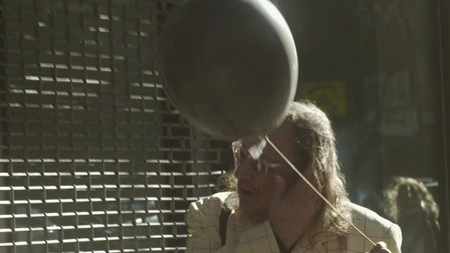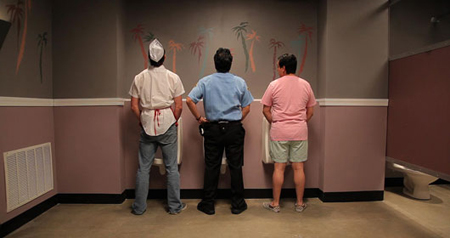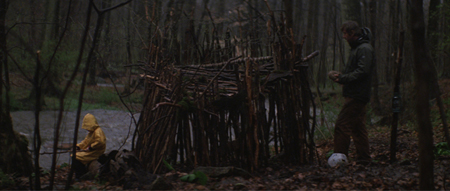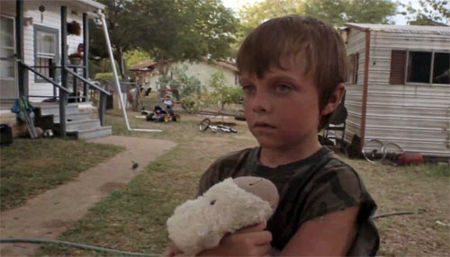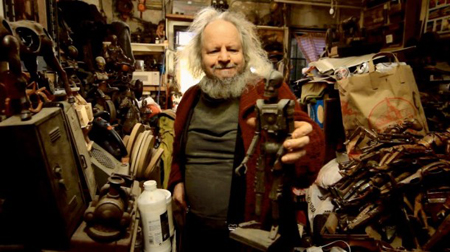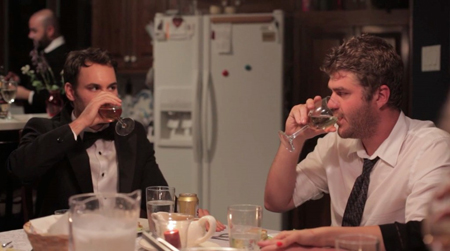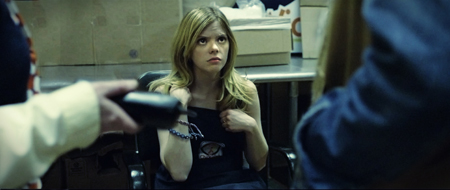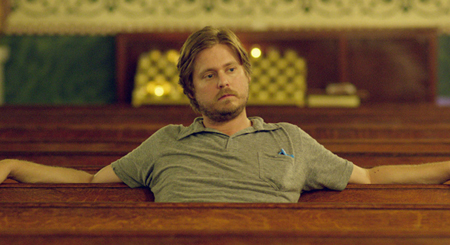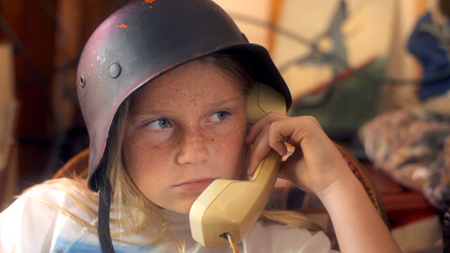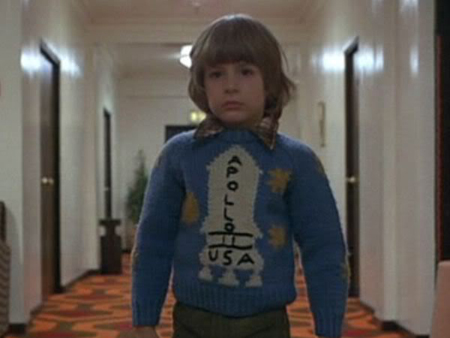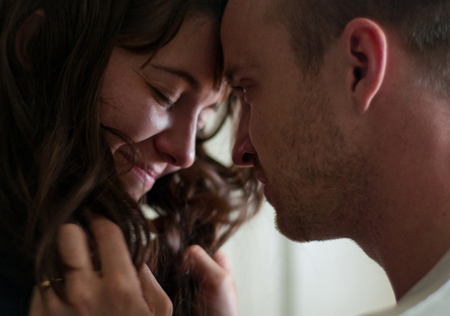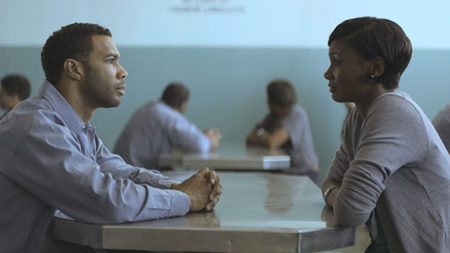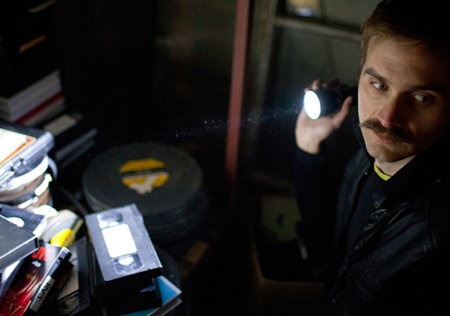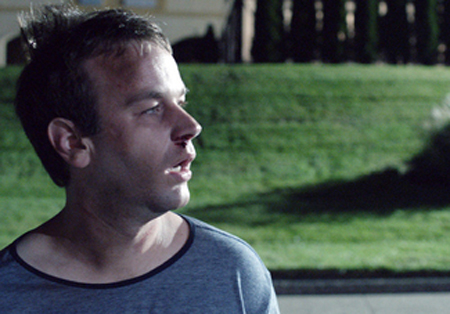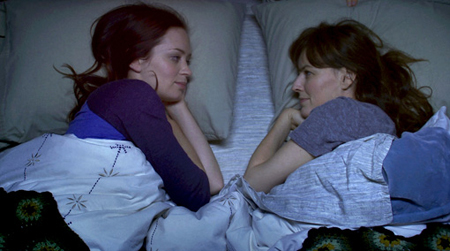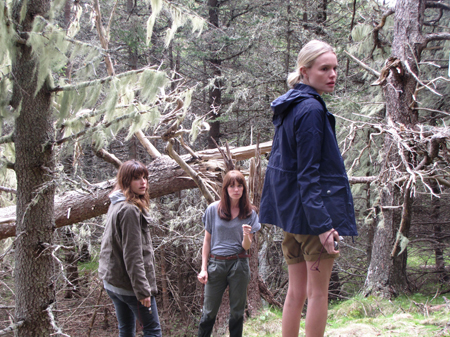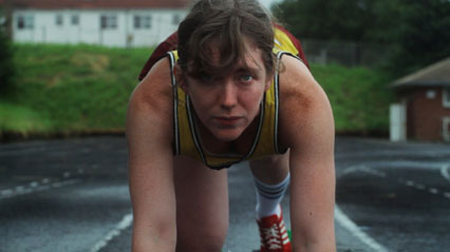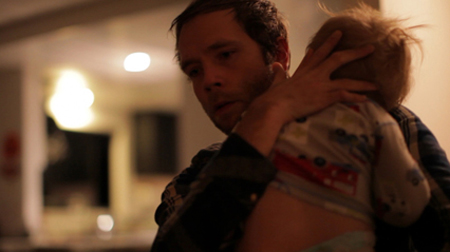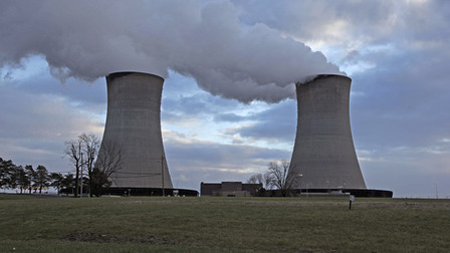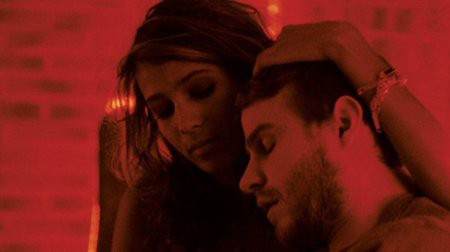SUNDANCE ’12: TULLY’S WRAP-UP
Before we begin, watch this. There, that’s better. Everyone to whom I suggested the idea that Joseph Pelling and Rebecca Sloan’s Don’t Hug Me I’m Scared should have been this year’s festival trailer agreed wholeheartedly. I dare you to watch it only once.
***SHORT FILM STANDOUTS***
Speaking of short films—and, as a shameless plug and reminder to submit to our ongoing monthly Hammer To Nail Short Film Contest—let’s begin with those. Unfortunately, I didn’t make it to any shorts blocks, but I did catch up with several great films along the way. Here are just a few gems:
Family Nightmare (Dustin Guy Defa, 10m) — There really is no way to overstate this, so I’ll just state it: Dustin Guy Defa’s Family Nightmare is a flat-out masterpiece. In only ten minutes, Defa manages to lay his family’s history on the table, and what a bleak, sobering history it is (it’s no wonder he was tentative about actually showing this thing to the world). Though no overtly graphic material is contained within, Family Nightmare is such a fragile act of personal expression that it stands as one of the most terrifying psychological horror films I have ever seen. Read my full HTN review.
The Black Balloon (Josh and Benny Safdie, 21m) — Hooray for the Safdie Brothers, whose latest cinematic adventure is another blast of gritty whimsy that only they could dream up (for their efforts, they were rewarded with a much-deserved US Fiction Jury Prize). In the Safdie Bros. universe, outright fantasy collides with urban docu-realism to capture the magical energy and spirit that gives New York City its timelessly unique heartbeat. Here, the story concerns an escaped black balloon that floats around town, bridging a variety of disparate scenes and citizens, culminating in a dreamily ecstatic climax.
Fourplay: Tampa (Kyle Henry, 17m) — The second installment in Kyle Henry’s anthology feature film (San Francisco is in the bag, Austin and Skokie are still to come) isn’t just the most out of control entry so far; it’s hard to think of another film period—feature, short, straight up porno—that delights in being so unabashedly sacreligious and profane. And though Fourplay: Tampa will without question shock, disturb, and disgust the more conservative viewers in the audience—truth be told, even the most open-minded of folks will likely be thrown for a loop—there remains something undeniably gleeful and sweet about the whole crazy circus that you might be surprised at how widely you’re smiling when the credits begin to roll. All told, the best way I can describe this film is as the circle-jerk offspring of the Marx Brothers and Kenneth Anger. Read my full HTN review.
The Fort (Andrew F. Renzi, 11m) — Better known as a producer up to this point, Andrew F. Renzi’s The Fort proves that he’s got serious directing chops as well. Opening with an extended one-take that reaffirms Jody Lee Lipes’ status as a cinematographic master, The Fort is infused with an atmosphere of danger without ever actually confirming our worst suspicions. In this way, the film becomes a fascinating case study in implication. Is this, in fact, the story of an evil man who killed a little boy? When all is said and done, I actually don’t think it is. But it’s impossible to know for sure. Probing, provocative stuff.
Heart Stop Beating (Jeremiah Zagar, 3m) — Zagar’s contribution to Focus Forward’s new short format documentary series is a true eye opener and while I haven’t seen the others, it’s hard to imagine that this 3-minute format can be utilized as intelligently, informatively, and entertainingly as Zagar does with this film. Watch it, as well as the other initial contributions from Jessica Yu, Gary Hustwit and Jessica Edwards, and more, right here.
Hellion (Kat Candler, 6m) — All praises to Kat Candler for setting up a scenario in which dark indie film hopelessness seemed like the only logical conclusion, only she flips that tired script and turns it into an exhilarating shot of kick-ass—dare I say optimistic—fun fun fun!
Meaning of Robots (Matt Lenski, 4m) — The saying goes that you should always keep them wanting more, but in the case of Matt Lenski’s portrait of reclusive outsider artist Mike Sullivan, I was so enraptured by the old-school New York creative insanity on display that I wanted to watch a whole f**king feature about this guy.
’92 Skybox Alonzo Mourning Rookie Card (Todd Sklar, 12m) — Not only does this film—hands down, no questions asked, no discussion needed—have the best title of the 2012 Sundance Film Festival, the dinner table showdown scene between rival brothers puts the Breaking the Waves wedding drink-off to shame. Watch it now.
In addition to ’92 Skybox Alonzo Mourning Rookie Card, you can watch nine more Sundance-selected shorts right here.
***STATUS REPORT***
Now that the awards have been handed out and the festival has officially wrapped up, it’s time to begin taking stock of the 2012 Sundance Film Festival. As recently as the final Friday of the fest, it appeared that the rather explosive market of 2011 had resulted in a general sense of timidity with regards to buyers. But the reality is that the crushing sudden passing of Bingham Ray distracted many for days, and a chunk of late-inning sales have added promise to what Mike S. Ryan so passionately decried in his own status report. But Mike wasn’t the only one. I heard a general sense of bickering that the narrative filmmaking just wasn’t delivering in the way that everyone had hoped it would. Based on the 25 features I saw, I am feeling much more optimistic.
HTN contributor Tom Hall was wisely recruited to write for the Filmmaker blog, and as usual, he has more eloquently expressed what my muddled brain wanted to say but didn’t know how to (this sentence feels grammatically wrong, and I am leaving it as such to reiterate this point). Specifically, my appreciation of Tom’s piece—read it in full here—has to do with, well, allow me to quote him here:
“I am not sure if the festival’s programming categories are especially meaningful anymore, other than allowing jurors to compare apples to apples and baffling the common man trying to find a film title in the festival’s Film Guide; it may be that, in a year when some of the best films in the festival were located outside the festival’s competitive categories, Sundance, which has done such a great job of refocusing the festival on filmmaking these past few years, may want to re-imagine the structure of its program.”
Granted, removing categories at all seems like it would be too daunting and revolutionary a concept to wrap one’s brain around, but there does seem to be an inherent problem in breaking sections down in this manner. Inevitably, some very worthy films seep through the cracks. Therefore, this year, I’ve decided to bestow my own random invented awards on films, removing their Sundance sections from the equation (I hope this feels more playful than self-important).
Grand Jury Prize For Every Single Reason Imaginable
Beasts of the Southern Wild (Benh Zeitlin, 91m) — My bar was raised as high as it could possibly be raised for this years-in-the-making Court 13 production, and, somehow, it still managed to deliver on its promise. Scrappy homegrown ambition pushed to the max, Beasts of the Southern Wild is a landmark achievement in modern American independent cinema. Though they are very different creatures, the way I felt walking out of the Eccles after seeing Beasts was comparable to how I felt after watching Take Shelter the year prior. As in: I kinda felt like we had seen all we had to see here and that we’d be better off packing up and heading back home. Of course, once the initial shock wore off, I was able to recalibrate and enjoy the rest of the program. But still, Beasts of the Southern Wild did, indeed, beast it so gloriously hard that I am dying to see it again.
Most Visceral World Premiere
Compliance (Craig Zobel, 90m) — We all know the racist stereotype about movie watching: black people talk to the screen while white people—especially film festival attending white people—only speak up to elicit a pained, snooty “Shhh!” Well, that theory was pretty much upended at the world premiere of Compliance, where from the very first few moments, the entire crowd was unable to contain themselves. And when the Q&A kicked off with Zobel being attacked by a few fans who, quite frankly, read the movie wrong, all I could think was, “Best… world… premiere… ever!” Compliance is indeed a firestarter, yet what makes it so impressive and excellent is that it brings humanity—albeit, ugly, unfortunate humanity—to the surface. Most importantly, it doesn’t just coast on its shocking premise to deliver surface thrills. Compliance speaks on a much deeper and thoughtful level.
Best Opening Credits
Keep The Lights On (Ira Sachs, 101m) — Full disclosure: the song that my wife and I chose to dance to at our wedding was “Close My Eyes” by Arthur Russell, but even removing that from the equation, the combination of Russell’s fond lament and hauntingly beautiful paintings helped to set the perfect tone for this memory of a motion picture. I’m actually anxious to see this film again, for Sachs made a bold decision that initially caught me off guard. Normally, when telling the story of a doomed relationship on film, it seems important to establish just how strong and passionate this true love is. Yet here, we never get a sense that either of these characters were experiencing once-in-a-lifetime emotions. Yet as a survivor of a relationship much like this one, I eventually understood that the purpose here wasn’t to chronicle the tragic crumbling of “true love”; Keep The Lights On is more directly a cautionary tale about how, for whatever foggy reasons, we don’t check out of a bad relationship when every single sign is shouting at us to do just that.
Hipster Culture White Male Privilege Mumblecore Destroyer
The Comedy (Rick Alverson, 96m) — On paper, this movie sounds redundant and pointless: I see enough spoiled, meandering, uninteresting privileged white hipsters in my daily life, why do I need to see a movie about it? But, holy God, man, what Alverson and his team have achieved here is no less than the invention of some new form of comedy language! It isn’t satire, it isn’t mockery… I still can’t figure out what it is, except to say that it feels like the definitive nail in the coffin for not just this type of person, but for a certain sub-genre of indie film in general. Attention white males in your late 20s/early 30s who are gearing up to make a low-budget dramedy about you and your friends’ lives: you better bring something life-changingly new to the table. Otherwise: don’t bother pressing record, for this movie has already taken a dump all over your camera.
Best Scene
For Ellen (So Yong Kim, 95m) — As a serious fan of So Yong Kim’s previous two features, I’m happy to report that For Ellen was one of my favorite narrative films at this year’s fest. Kudos to Paul Dano for embodying his character in a way that felt truly lived in and genuine—no actor-schmactor futzing around here. Also, much credit goes to Reed Morano’s cinematography, which elevates itself beyond mere sturdy handheld naturalism into something more achingly poetic. As for the best scene award, no, it’s not Dano’s pantomiming/dancing to Whitesnake in a dive bar, though that is something to behold; it’s when he takes his daughter shopping at a toy store in a nearby mall. As this scene unfolded in narcoleptic time, the daughter inching her way around the store to settle on the toy that she wanted, I couldn’t help myself—I started whisper chanting, “Don’t cut! Don’t cut! Don’t cut!” Of course, Kim does cut, but not before it had lasted long enough to fill me with satisfied glee. (Oh yeah, one final note: based on this and Treeless Mountain, I propose that So Yong Kim be hired to direct all child performances for every movie that is ever made from now until evermore.)
Kid-Thing (David Zellner, 83m) — Actually, this film has two worthy candidates as well, but if I had to pick one, it wouldn’t be the early film prank phone call. It would be the kitchen table scene, which really isn’t worth describing except to say that it’s one of my favorite memories of 2012 Sundance. As a whole, David and Nathan Zellner’s portrait of a bottled up young girl (Sydney Aguirre) played to me like Harmony Korine’s The Turin Horse, and if those names excite you, this film will too. Having said that, though, the fact remains that the Zellner Brothers have their own totally unique vision, which is both utterly sarcastic and extremely sincere at the same time. Kid-Thing is another formidable entry in their dazzlingly expansive oeuvre.
Best Documentary
Room 237 (Rodney Ascher, 104m) — Ascher’s fascinating investigation into the horsesh*ttingly glorious practice that is film theory, specifically with regards to Stanley Kubrick’s The Shining, is mesmerizing, intellectually stirring, and laugh-out-loud funny. I am worried that the clearances associated with this film will make it a downloadable curio at best, but if things can be worked out, there is no question that this is one of the year’s most startlingly pleasurable new films and should be seen by anyone with a passing interest in film theory, Stanley Kubrick, or movies in general.
Most Exhilarating Blast From The Past
Bones Brigade: An Autobiography (Stacy Peralta, 110m) — For anyone who came of age during the 1980s, Peralta’s documentary about the superstar teenage team that he assembled is a surefire hit. Best—and perhaps trickiest—of all, this doesn’t seem like self-serving filmmaking whatsoever. Peralta must have had an incredibly hard time figuring out how to approach this intimate subject matter, but he pulls it off like a pro. (On a personal note: one of the first home movies I made with friends was called The Search for Animal Ben, so, yes, this story is one that hit very close to home.)
Best Resurrection Of A Musical Genius
Searching For Sugar Man (Malik Bendjelloul, 85m) — I wouldn’t necessarily call this great filmmaking, but when you have material like this, who cares. Bendjelloul’s resurrection of Sisto Rodriguez is a powerful reminder of how musical myths and legends are born, but more than that, it is guaranteed to turn people on to an artist whose time in the spotlight is longgg overdue.
Best Performance
Smashed (James Ponsoldt, 91m) — This year, child performances reigned supreme—Beasts of the Southern Wild, The End of Love, For Ellen, Kid-Thing, etc.—and though it’s hard to pick any performance over Ann Dowd’s in Compliance, I’m going to give my award to Mary Elizabeth Winstead, who pulls off something remarkable in Smashed. Her performance feeds into what director James Ponsoldt has accomplished with all of the elements at his disposal. Typically, this premise would result in a far more generic “Sundance” movie, but here, Ponsoldt delivers an honest dose of R-rated sweetness that feels closer to real life than movie land. It’s a deft balancing act, but Winstead’s commitment to her character and her ability to convey the frustrated, complicated depths of hitting rock bottom and gradually rising back up to the surface, is quite a feat.
Best Cinematography
Middle of Nowhere (Ava DuVernay, 107m) — Bradford Young does it again in DuVernay’s heartfelt drama about a young wife (Emayatzay Corinealdi) who is forced to regroup when her husband is sent to prison for years. DuVernay elevates her made-for-TV movie premise with the help of the aforementioned Mr. Young, as well as an overriding commitment to telling this story without relying on tried-and-true narrative formula tricks. For her efforts, she was awarded with the U.S. Directing Award.
Scariest Movie
V/H/S (Adam Wingard, Glenn McQuaid, Radio Silence, David Bruckner, Joe Swanberg, Ti West, 104m) — I admit to being skeptical of this anthology film for just about every reason imaginable, and while it did run a tad long (granted, I was watching it at midnight) and doesn’t always hit its mark, V/H/S still manages to pack quite a wallop. Its anthology set-up allows it to play like a cinematic mix tape, preying on our modern short attention spans and allowing things to keep tumbling forward before we can ever get too comfortable.
A Modern Master Delivers Once Again
China Heavyweight (Yung Chang, 89m) — It’s hard to follow a debut feature that I consider to be one of the best documentaries ever made—Up The Yangtze—and while China Heavyweight certainly doesn’t hit those outer space-shattering heights, it is nonetheless a beautifully photographed portrait of individuals in modern China who are trying to make their way through a complex world. This and Kim Longinotto’s Gaea Girls would make for a tasty double-feature!
It’s Okay To Crowdplease, But Hold The Cheese, Please
Sleepwalk With Me (Mike Birbiglia, 90m) — Birbiglia’s feature directorial debut is a pretty damn assured one for a first timer. As I hadn’t read the book upon which this film was based, it made for a refreshingly pleasant ride (no expectations to check at the door, thank you very much). As soon as it started, I knew right away that this would win the NEXT section’s Audience Award, but in this case, I don’t mean that as a pejorative. Birbiglia’s voice is personal and distinct, yet it is affable in the best way possible. You will be hearing much more about Sleepwalk With Me throughout the year, no question about that.
Most Adorable Performances
Your Sister’s Sister (Lynn Shelton, 90m) — I realize that when speaking about adults and not children, this sounds like a pretty lame award to hand out, but in this case, it’s what makes Shelton’s follow-up to Humpday such a winner. Mark Duplass is his usual man-crushworthy self, and after this and Nobody Walks, I am tempted to call Rosemary DeWitt the most soulfully lovely actress on the planet, but it is Emily Blunt who surprised me the most with her performance. Yes, she is a stunning movie star, but she somehow manages to escape those trappings completely. When she says, “I can’t,” through heartbroken tears, she isn’t a stunning movie star at all, in fact—she’s just an adorably love struck regular girl. As for the overall film, Shelton proves that Humpday was no fluke, that she’s capable of using limited means to make romantic comedies that are smarter, funnier, and more grounded than anything in the multiplex.
Most Bad-Ass Fun
Black Rock (Katie Aselton, 83m) — Working from a script by her hubby Mark Duplass, Katie Aselton puts a thick-soled boot to the mellow groove she established with The Freebie in favor of pure genre kicks this time around. Yet that’s not entirely accurate, and it’s why Black Rock is more than just a fun b-movie. Yes, the premise is pretty off the wall and firmly lodged in Movie Land, but the relationships are portrayed with enough sensitivity that they bring more earthly grounding to the proceedings than other films of this ilk.
Atmosphere Is Everything
The Perception of Moving Targets (Weston Currie, 81m) — Currie’s experimental film plays like a cinematic sleep cycle of sorts in recounting the dreams of several residents of a suburban block over the course of one night, but there is a haunting power to the filmmaking itself that makes the experience more emotional than intellectual. Which is a very good thing. When it comes to experimental storytelling, I personally prefer work that might not add up in an overtly “logical” sense but I’m too busy feeling it in my stomach to notice. The Perception of Moving Targets worked me over in that way.
Most Insane Child Performance
The End of Love (Mark Webber, 100m) — Webber’s decision to ‘cast’ his own two-year-old son, Isaac, in this autobiographical drama was a very wise one indeed. Honestly, without it, I’m pretty convinced that the whole premise would have fallen apart. By keeping things so incredibly personal, Webber was able to maintain a heightened state of intimacy that was just about impossible to deny whenever Isaac was on screen.
Most Unheralded Documentary
The Atomic States of America (Don Argott and Sheena M. Joyce, 92m) — In a year that was particularly strong with attention-grabbing message docs—frankly, there are too many to name, but just look at the competition slate and there you have them—it’s unfortunate that Argott and Joyce’s vital film didn’t seem to attract the attention that it deserved. While The Atomic States of America is more restrained and muted in its approach than, say, Josh Fox’s GasLand, the information contained within is no less maddening. One hopes that Sundance was just a quiet launching pad for this important film.
The Slowest Burn
Simon Killer (Antonio Campos, 105m) — Let me make this clear: Antonio Campos’s Simon Killer is a dramatically sharper and more effective film than Steve McQueen’s Shame, and the more that I think about it, the more it lingers as a work of top-notch filmmaking across the board. But there is something about its worldview that keeps me from giving all the way in. So while Simon Killer was without question one of the most confident and authoritative pieces of filmmaking at the 2012 Sundance Film Festival, I confess to hoping Campos tackles a less bluntly “dark” subject next time around. A comic romp? Bring it on, Borderline Films!
Most Complicated Viewing Experience
West of Memphis (Amy Berg, 150m) — Having seen Paradise Lost 3 just a few months earlier, it was impossible not to watch Berg’s documentary in a compare/contrast fashion, which is one of my least favorite things to do as a viewer. Here, I couldn’t not do it. Having said that, this film is a worthy addition to the cause, as it presents information that we haven’t seen before. But what made the experience even more complicated for me was what also caused a bit of a red flag in Paradise Lost 3 (and what borderline ruined Paradise Lost 2). Namely, all of these filmmakers go to great lengths to point out how these teenagers were convicted through the application of immoral “guilty by vague association” tactics, and here, Berg and her team devote a large portion of their third act to stating the—albeit utterly convincing—case that Terry Hobbs is, in fact, guilty of the crimes. It’s hard not to feel that there is some sort of weird double-standard happening, even while you look at Terry Hobbs in his spanking white L.A. Gear sneakers and think, “Of course that guy f**king did it.”
And lastly…
FILMS I AM MOST UPSET THAT I DID NOT GET TO SEE
Bestiare (Denis Côté, 72m)
Corpo Celeste (Alice Rohrwacher, 98m)
Elena (Andrei Zvyagintsev, 109m)
Grabbers (Jon Wright, 92m)
Oslo, August 31st (Joachim Trier)
An Oversimplification of Her Beauty (Terence Nance, 95m)
Safety Not Guaranteed (Colin Tervorrow, 85m)
Save The Date (Michael Mohan, 98m)
The Surrogate (Ben Lewin, 98m)
Wuthering Heights (Andrea Arnold, 128m)
+ ALL DOCUMENTARIES
See you next year, Sundance.
— Michael Tully








